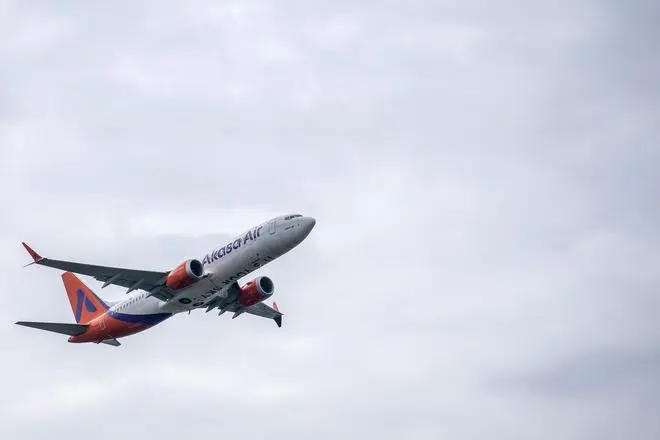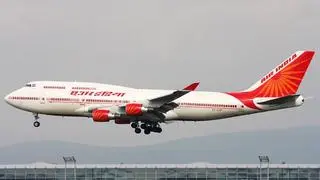During the Dubai Air Show in November last year, the latest entrant in the Indian commercial aviation space, Akasa Air, made one of its bravest decisions: placing orders for Boeing 737 MAX 8.
Whether this was borne out of the fact that the Airbus A320 neos were not available or because Boeing's offer came with freebies and discounts, it still goes to the credit of the airline management to go with the US plane maker for its fleet. Now that its done, the airline will have to live with it, as having a mixed fleet of Airbus and Boeing for its operations can be quite daunting. It is something that they must have taken into consideration before placing the order for 72 aircrafts powered by CFM's LEAP-1B engines from Boeing for a list price of nearly $9 billion.
BusinessLine’s Aviation Editor, K Giriprakash, analyses ‘Big Bull’ Rakesh Jhunjhunwala’s chances of making Akasa Air a success in a sector plagued with losses
The order consists of the initial delivery of 18 aircraft by March 2023, followed by delivery of the remaining 54 over the next four years. The order will have a mix of MAX8-189 seats, and high-capacity MAX8-200s with 197 seats. The airline plans to add two aircrafts per month in its first year.
Given the aircraft's record, choosing Boeing over the others showed that the airline management was willing to go against the tide. With its first flight taking off on August 7, Akasa Air's boldest move yet will see it compete in an industry where one airline has an overwhelming market share of 58 per cent while the other players split the rest among themselves. But that is only one part of the challenge. The country's newest airline, in which billionaire investor Rakesh Jhunjhunwala owns a 46 per cent stake, will have to contend with issues such as galloping ATF prices and the airfare cap. Even though it may not directly impact Akasa Air, the industry is grappling with safety issues, aborted take-offs, disgruntled pilots, cabin crew and maintenance technicians. What was seen as a problem only state-owned airlines faced in the eighties and the nineties is now hurting the private airlines too.
Boeing order
The 737 MAX was grounded in 2019 after the two deadly crashes that killed 346 people. Since then, Boeing claims it has worked hard to return the aircraft to the tarmac. These include coming together of engineers, scientists, researchers, mechanics, and pilots in a thorough process involving more than a thousand tests and check flights. In addition, the Boeing’s website points out that pilots of more than 80 airlines tested the enhancements firsthand in a full-motion flight simulator.

An aircraft of India's newest airline Akasa Air takes off on its first flight in Mumbai, India, Sunday, Aug. 7, 2022. The Mumbai based low-cost airline Sunday made its inaugural flight to Ahmedabad.(AP Photo/Rafiq Maqbool) | Photo Credit: RAFIQ MAQBOOL
According to Boeing, the entire Max family consisting of 737 MAX 8 and 9, has one single engineering blueprint that spans the short, medium and long haul aircraft that helps the customer to scale up its operations rapidly without compromising on profitability and efficiency. It also claims that the 737 MAX family is the most fuel-efficient on the planet, providing the lowest seat-mile costs for a single-aisle aeroplane.
"In India, given the price-sensitive nature of the market, it is imperative that any aircraft has to deliver superior economics. This is usually measured by the lowest seat-mile costs and total cost of ownership. Therefore, Boeing offered Akasa a product with the range, fuel consumption and configurations that bode well for their business model," Satyendra Pandey, Managing Partner at aviation advisory firm AT-TV said.

Akasa Air’s crew uniform, with their fabric specially made using recycled polyester fabric, made from pet bottle plastic salvaged from marine waste. | Photo Credit: -
In earlier interviews, Akasa Air's Founder, CEO and Managing Director, Vinay Dube, has pointed out that the aviation industry is a game of pennies and that an airline must work hard to sustain itself in a highly competitive environment.
Akasa Air begins operations in the Mumbai-Ahmedabad sector with 26 weekly flights followed by 28 weekly flights between Bengaluru and Kochi from August 13. Mumbai and Bengaluru will initially be its bases, having one aircraft each. The Bengaluru-Mumbai flight will commence on August 19.
Shareholders
The shareholding pattern of the airline is quite widespread, with Jhunjhunwala holding nearly 46 per cent. The Vinay Dube family is the next biggest shareholder owning slightly over 31 per cent. The entire shareholder group comprises 15 members in the parent SNV Aviation Pvt. Ltd which adds strength to the management, as each brings varied experience to the airline's operations.
Akasa Air's website points out that the 'sky belongs to everyone; it embraces all, clearly indicating that there is space for everyone in the Indian aviation sector. Hopefully, the newest airline startup in the country will find that space easier to navigate.







Comments
Comments have to be in English, and in full sentences. They cannot be abusive or personal. Please abide by our community guidelines for posting your comments.
We have migrated to a new commenting platform. If you are already a registered user of TheHindu Businessline and logged in, you may continue to engage with our articles. If you do not have an account please register and login to post comments. Users can access their older comments by logging into their accounts on Vuukle.